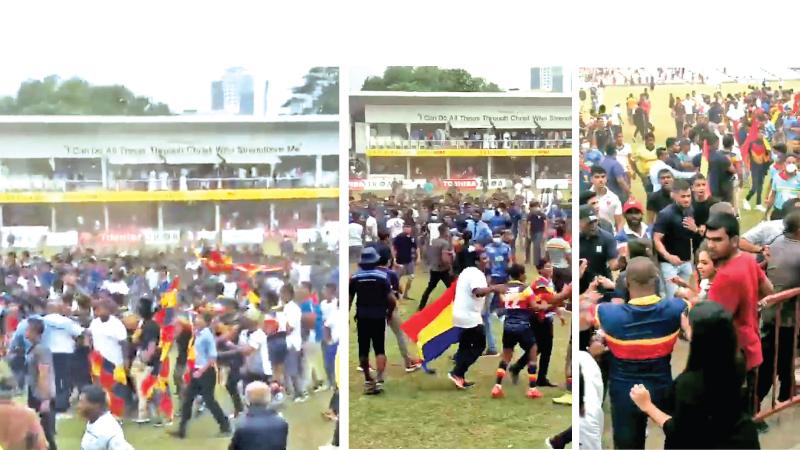
Ex-Trinity College principal Andrew Fowler-Watt had the most compelling message for schoolboy guardians that has become a prophetic utterance five years down the line:
Imagine the next bout of violence at a school rugby match when an enraged fan or maniac walks up to the referee and threatens to pump a bullet in his brain. Experts will argue the chances of it happening are distantly remote or never, but it could be the only thing that could open the eyes of the keepers of the sport to bring to an end the ever growing list of violence in the cradle of rugby in Sri Lanka.
 As many as 12 episodes of violence that took place over a five-year period were well documented by the Sunday Observer three years ago and thanks to the Covid pandemic, peace prevailed for the next two years until the sleeping beast took a different twist when a female proved her species could be deadlier than the male as the referee at the first post pandemic match was physically abused and assaulted.
As many as 12 episodes of violence that took place over a five-year period were well documented by the Sunday Observer three years ago and thanks to the Covid pandemic, peace prevailed for the next two years until the sleeping beast took a different twist when a female proved her species could be deadlier than the male as the referee at the first post pandemic match was physically abused and assaulted.
The rowdy scenes after S. Thomas’ College beat Trinity College at Havelock Park in Colombo last week could not have come at a worse time when the country is focused on economic turmoil, power outages, lawless behaviour and street protests and the custodians of the sport at school did very little or nothing to ensure sanity at rugby.
Last week’s violence not only brought into question the lethargic nature of schools rugby officials but also the depths to which the sport has fallen into at both nursery and semi professional club level while a shadowy mafia calls the shots at senior level and budding players at school are being exploited to win even at the cost of life and limb to satisfy the whims and fancies of commercial partners, high earning coaches and old boys with inflated egos.
President of the 106-year old Havelocks Sports Club Thusitha Peiris summed up the scenario in the club set-up but avoided any reference to the shadowy mafia two days before the latest round of violence when he declared at a corporate sponsorship of his team that his players continue to be, what he called, “poached” by rival clubs offering higher financial deals.
“For how long can we go on like this,” Peiris said. “It is difficult for us to retain players who depend on rugby. We produce players and other clubs poach them. They prefer to take the finished product and make a champion side.”
 Two seasons before the Covid 19 pandemic halted rugby, Havelocks lost as many as eight top notch players to rival clubs and this season another five players moved out enticed by bigger offerings.
Two seasons before the Covid 19 pandemic halted rugby, Havelocks lost as many as eight top notch players to rival clubs and this season another five players moved out enticed by bigger offerings.
Insiders say the shadowy mafia true to its image does not appear in public but has stationed men in important areas including the Referees Society whose members it influences to decide the outcome of a specific match which the referees themselves vehemently deny and dismiss as nonsense.
But no referee or expert will be able to deny the fact that rugby at club level is today nowhere near its swashbuckling days of the 1980s when legends like Hisham Abdeen, Chandrishan Perera and a host of others pulled in thundering crowds among them ticket-less schoolboys who scaled over brick walls to catch a glimpse of their heroes.
Ex-rugby officials however contend that the present day rugby field can be easily manipulated unlike 30 years ago when mostly the affluent and gentlemanly played the game that is now in a changed set-up with the majority of players coming from lesser platforms and hoping to strike a goldmine at clubs that have the money to throw at them.
But schoolboy players have become the biggest pawns in the sporting stakes and come under unimaginable pressure to deliver in the name of college pride at the expense of sportsmanship.
The backstage drama in the school set up runs a different course and ironically the previous principal of Trinity College, Andrew Fowler-Watt in launching his school’s centenary cricket encounter against St. Anthony’s College in 2017 pleaded that schoolboys be spared the torment and abuse of the win-at-any-cost syndrome and be allowed to enjoy their boyhood passions.
His wisdom could not have been echoed at a more appropriate time when the concept of sport has been bastardized in the name of prestige and pride and the outcome more frightening than ever before.
The sordid scourge at both school and club has now become the inheritance of the current Sri Lanka Rugby hierarchy and the Sri Lanka Schools Rugby Football Association whose predecessors showed very limited concern to even minimise the continuity of violence.
Only once did the keepers get it right when an anti-riot police squad was put on standby seven years ago at the CR and FC ground at Longden Place in Colombo where St. Joseph’s College hosted Dharmaraja College after their previous match in Kandy ended in violence on and off the field.
To the surprise of many, the players of both schools acted in perfect harmony before the start of the match and after, leaving the presence of law-enforcement officers with a question mark. Does school sport have to be shielded from notoriety?
